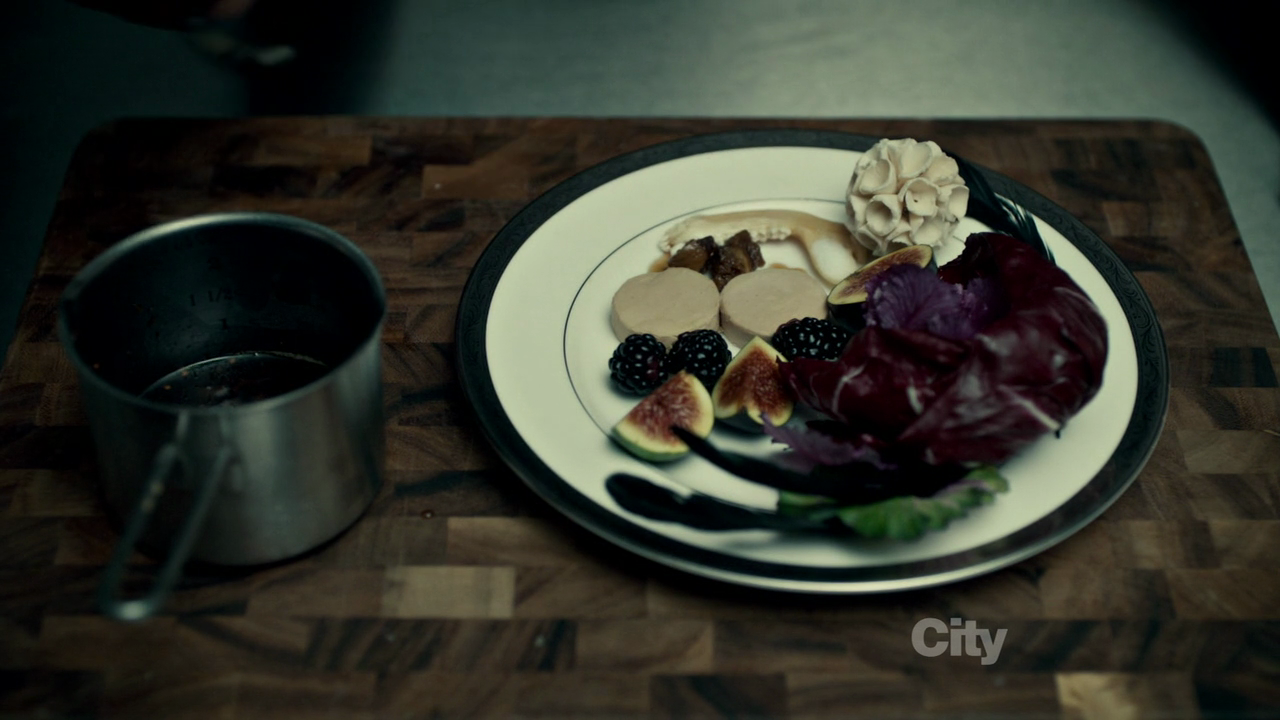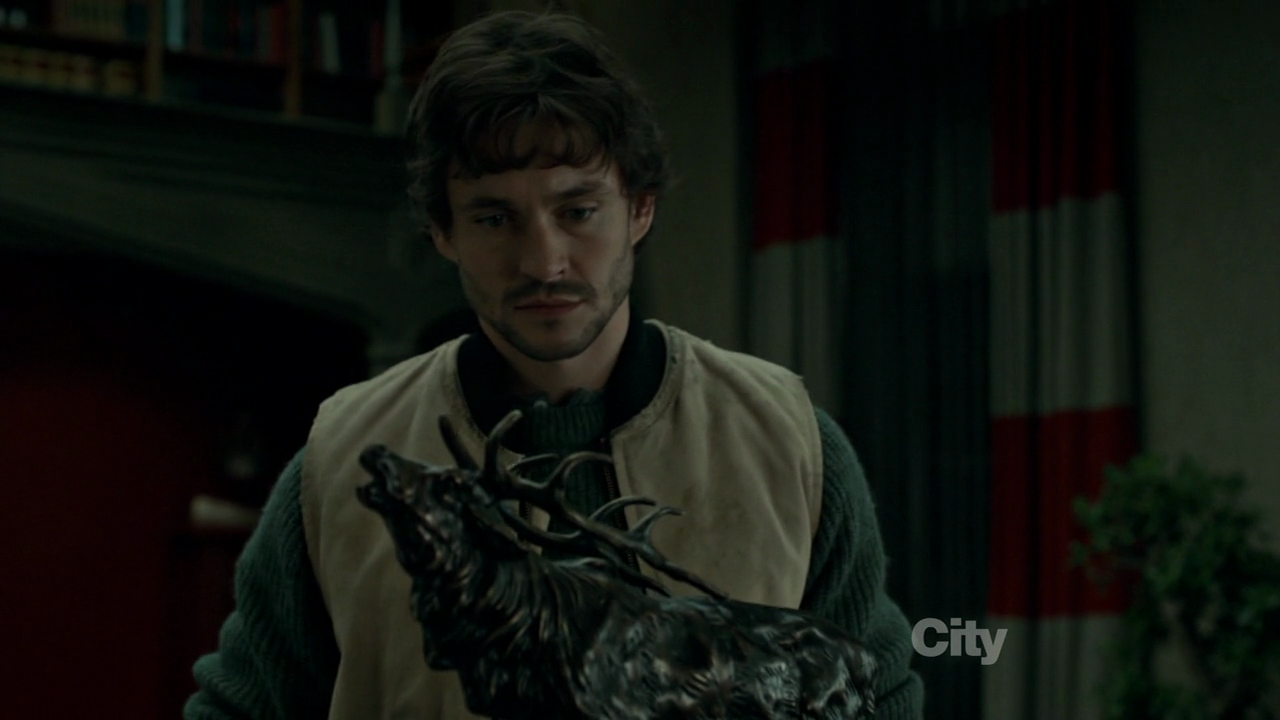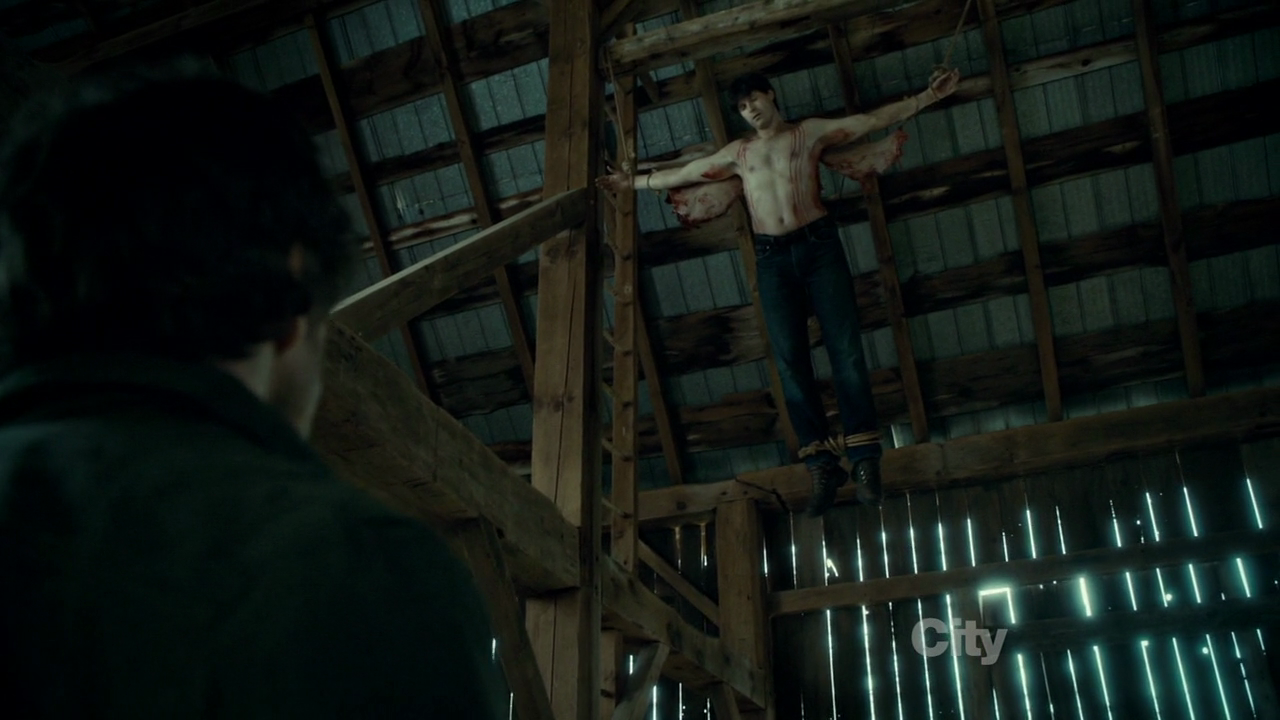The Proverbs of Hell 5/39: Coquilles
 COQUILLES: Coquilles are shells, referring either to shellfish like oysters or to casseroles served in a shell-shaped dish. The poetic meaning would involve something about how people are just shells for the higher angelic spirit within. The crass (and likely intended) meaning is a visual pun based on what happens when you flay wings off of someone’s back.
COQUILLES: Coquilles are shells, referring either to shellfish like oysters or to casseroles served in a shell-shaped dish. The poetic meaning would involve something about how people are just shells for the higher angelic spirit within. The crass (and likely intended) meaning is a visual pun based on what happens when you flay wings off of someone’s back.
POLICE OFFICER: Do you have a history of sleepwalking, Mr. Graham?
WILL GRAHAM: I’m not even sure I’m awake now.
The best interpretation of this line, of course, is that even Will has noticed the weird way in which the sky moves at the wrong speed and fucking stags keep showing up, and has come to realize he lives his life in a strange and murderous dreamscape. Either way, though, he’s right.
HANNIBAL: I’d argue good old-fashioned post traumatic stress. Jack Crawford has gotten your hands very dirty.
WILL GRAHAM: Wasn’t forced back into the field.
HANNIBAL: I wouldn’t say forced. Manipulated would be the word I’d choose.
Manipulation is a vital yet inchoate topic in Hannibal, and this line sets up much, both about the next episode and about Jack. Later in the episode, as Jack tells Will that he’d feel guilty about all the murders he didn’t help stop if he returned to teaching (a statement designed in part to ensure he would), the blunt reality that Jack is an exceedingly manipulative man. This does not mean that his genial and reasonable persona is a facade – he is legitimately a good person who seeks to make the world a better place by preventing murders. But his goodness is ruthless, and he does not question it, which can and does prove tragic for those pulled along in its wake.
JACK CRAWFORD: Mr. and Mrs. Anderson according to the register. Mutilated, displayed. Thought it might be the Chesapeake Ripper but no surgical trophies were taken.
This marks the first mention of the Chesapeake Ripper, setting up “Entrée,” where that plot finally begins in earnest. This is a somewhat odd decision – this plot starts up early enough to have clearly been in mind all along, and yet it’s curiously and conspicuously absent from the initial setup, in ways that, through the first four episodes, actively fail to make sense. The biggest of these, of course, is a matter of narrative necessity – Will can’t make the obvious connection between the copycat killer and the Chesapeake Ripper because the end-of-season plot hinges on him not noticing it. Nevertheless, the fact that Will has clearly been consulted on this case at some point seems like something that should have come up in his early conversations with Jack.
JACK CRAWFORD: Who’s mocking who here?
WILL GRAHAM: He’s not mocking them. He’s transforming them.
Budish’s killings are a tacit mirror of Francis Dolarhyde’s, with the person being transformed through the acquisition of wings being the victim instead of the killer. Notably, where Dolarhyde seeks to transform into a demonic figure, Budish transforms his victims into angels, furthering the sense of him occupying the negative space around the absent (and as of yet unmentionable) Dolarhyde.
WILL GRAHAM: I need a plastic sheet to cover the bed.
In a show full of grim comedy beats, this may be the grimmest, played with sublime reluctant awkwardness by Hugh Dancy.
HANNIBAL: At my table, just the cruel deserve cruelty, Mrs. Crawford. Which is why I employ an ethical butcher.
BELLA CRAWFORD: An ethical butcher? Be kind to animals and then eat them?
HANNIBAL: I’m afraid I insist on it. No need for unnecessary suffering. Human emotions are gifts from our animal ancestors. Cruelty is the gift humanity has given itself.
JACK CRAWFORD: The gift that keeps giving.
Hannibal’s account of cruelty contradicts itself, though in a Luciferian way as opposed to an incoherent one, where the words “need” and “unnecessary” carry a near-infinite weight of ambiguity. And yet there is the sense of a genuine principle being expressed here – Hannibal is consistently shown to have genuine affection for Bella, and his insistence on defending his ethics appears to come out of a genuine desire for her good favor. And it is worth stressing that there are significant ways in which Hannibal’s self-defense is true. Nowhere is he shown demonstrating physical sadism, for instance – he does not relish killing his victims in particularly agonizing ways, or work to prolong agony. When he mutilates people, it tends to be with surgical precision and anesthetic agents. The conceptual agonies he’ll inflict on people are limitless, and he is in no way averse to necessary suffering, but he has no interest in physical pain for the sake of it, and indeed is inclined to view it as rude.
Notably, the line also calls back to Will’s assessment of the crime scene, where he describes being flayed as the killer’s “gift” to his victims.
HANNIBAL: A tumor can definitely affect brain function, even causing vivid hallucinations. However, what appears to be driving your Angel Maker to create heaven on Earth is a simple issue of mortality.
WILL GRAHAM: Can’t beat God, become him.
The third possibility, of course, is the one that Hannibal takes: can’t beat God, become the Devil. The prospect is unmentionable within this episode, ultimately erased by the way in which the Angel Maker’s crimes are an inverted version of Dolarhyde’s. (That and the need to focus on cancer instead.)
HANNIBAL: Jack gave you his word he would protect your head space. Yet he leaves you to your mental devices.
WILL GRAHAM: Are you trying to alienate me from Jack Crawford?
Blatantly yes, although it’s difficult to divine Hannibal’s motivations in doing so. Generally speaking, Hannibal has seemed inclined to push Will deeper into his work for Jack, deliberately opting not to intervene to protect Will’s mental health. Indeed, Jack most certainly did not promise to protect Will’s headspace – he farmed the job out to Hannibal. The best guess if one insists on an in-universe explanation is that Hannibal is trying to cut Will off from his support systems, but treating Jack as a support system instead of as a force pushing Will deeper into the sordid dreamscape is bizarre. The realistic answer is probably that it’s a somewhat sloppy bit of writing designed to make the episode’s closing scene more of a payoff.
BEVERLY KATZ: So he makes angels out of demons.
JIMMY PRICE: How does he know they’re demons?
WILL GRAHAM: He doesn’t have to know. All he has to do is believe.
And yet he’s right – the victim in question was impersonating a security guard, and Budish somehow identifies this. Given that his victim selection is elsewhere shown to be “he kills the people who appear to him with burning heads,” this becomes the point where it is impossible to deny that there is a supernatural dimension to the show. The only remaining ambiguity is whether Hannibal is a supernatural creature, which, if Budish gets to be, is hardly much of an ambiguity.
BELLA CRAWFORD: Women who love their husbands still find reasons to cheat on them.
HANNIBAL: Not you. Yet you seem more betrayed by Jack than your own body.
BELLA CRAWFORD: I don’t feel betrayed by Jack. And there’s no point being mad at cancer for being cancer.
HANNIBAL: Sure there is.
Bella’s illness is expanded from a subplot in Silence of the Lambs. She becomes, however, the show’s first rock solid female character, in part on the back of Gina Torres’s performance, but mostly on the back of the fact that, unlike Alanna Bloom, it’s always clear what she’s doing in the plot. Her animated fatalism is a coherent position that imparts a distinct and complimentary flavor to the overall show. Hannibal’s declaration that it makes sense to be mad at cancer for being cancer is one of the quieter revelations of his hubris: the idea of being angry at a raw force of nature comes naturally to him. Fittingly, then, this episode shows Hannibal seeming to have a better grasp on the killer’s pathology than Will does.
HANNIBAL: You’re not unlike this killer.
WILL GRAHAM: My brain is playing tricks on me?
HANNIBAL: You want to feel such sweet and easy peace. The Angel Maker wants that same peace. He hopes to feel his way cautiously inside it and find it is endless all around him.
Hannibal’s line is originally a description of Francis Dolarhyde, continuing the sense of parallelism between them. It is notable that the focus on peace as a physical feeling of tranquility and low stimulation reinforces the suggestion of Will as existing on the autism spectrum. (See also, slightly earlier in the scene, Will contemplating zipping himself into a sleeping bag.)
The stag is revealed as not entirely an imaginary construct as Will sees its literalizing form and visibly comes to the brink of drawing the connection. Not only does Hannibal have a stag statue lying around for seemingly no reason other than poking at Will’s mental constructs some more, but Will clearly recognizes the stag statue as something closely related to what haunts his dreams. This only makes sense if they are not entirely dreams – if, in other words, he’s not entirely awake now.
Further confirmation that Budish is a supernatural being comes in the fact that he was able to do this to himself. This also introduces what will become a recurring trope in the series of serial killers being killed in accordance with their own aesthetic. Usually it will be Hannibal who does this, as part and parcel of his compulsion to dominate his victims, but in this case Budish does it himself, a natural conclusion of his underlying fear. It’s notable, of course, that Budish’s art is nearly mistaken for Hannibal’s at the episode’s outset.
ELLIOT BUDISH: I will give you the majesty of your Becoming.
Once again Budish is used as a tacit invocation of Francis Dolarhyde, for whom the notion of “becoming” is crucial. The scene, however, is heavily reworked from the script and turned into a hallucination on Will’s part, presumably to resolve the problem that the script had Jack Crawford standing in the doorway doing fuck all through this scene and, more broadly, to avoid the rather ridiculous excess of Budish climbing back down after flaying himself. Instead it becomes a confirmation of Will’s claims of deteriorating mental health immediately prior mixed with vague but pleasantly portentious foreshadowing.
JACK CRAWFORD: I don’t want you to be alone. Now or ever.
BELLA CRAWFORD: We’ll beat this together?
JACK CRAWFORD: This is your fight. But I’m in your corner and I’m not going anywhere.
BELLA CRAWFORD: I appreciate that, Jack. But I’m not comforted by it. I know that’s what you need. To comfort me. But I can’t give you what you need.
The writing of Bella’s terminal illness and Jack’s reaction to it is refreshingly nuanced, with Bella consistently written as something other than the perfect and beatific sick person while still remaining sympathetic. Jack, meanwhile, is unflinchingly a good person who says the right things, and yet as with Will his good intentions and the utter defensibility of his actions does not, strictly speaking, matter.
JACK CRAWFORD: What do you want, Will?
WILL GRAHAM: I’m going to sit here until you’re ready to talk. You don’t have to say a word until you’re ready, but I’m not leaving until you do.
This moment of male emotional bonding seems to be the motivation for the episode’s otherwise strained conflict between Jack and Will. This is well outside the show’s wheelhouse, and is inadequately paid off in subsequent episodes, but is nevertheless a nice moment that goes a long way towards finding a basis for Jack and Will’s relationship other than Jack’s exploitation of Will, even if it probably would be more interesting to actually see their scene instead of ending the episode at the stoic male failure to talk.



April 24, 2017 @ 9:46 am
Is Hannibal’s attempted alienation of Will from Jack actually a feint, a double bluff? Is he suggesting, through ostensibly treating Jack as an untrustworthy support structure, that Jack is precisely that: a support structure? …thereby pushing Will closer to Jack via a fairly crude bit of reverse psychology.
April 25, 2017 @ 6:07 pm
My reading when I last watched it was that he was trying in a general sense to undermine Jack’s position with Will as, whatever else he might be to Will, a symbol of “goodness,” a guy who even if he gets a little dirty to do it is always trying to do “the right thing.” Not to specifically say that Jack is wrong about this or that or that some particular thing makes him a bad person, but to just sort of decouple “Jack Crawford” and “doing the right thing” in Will’s head.
April 26, 2017 @ 2:57 pm
“WILL GRAHAM: Can’t beat God, become him.
The third possibility, of course, is the one that Hannibal takes: can’t beat God, become the Devil.”
In my reading this is a more straightforward mirroring between the killer of the week and Hannibal (I haven’t re-watched the show recently, but it seems a trick it’s very fond of) and Will actually (albeit unknowingly) profiles Hannibal as well. He wants to become God, because it makes him feel powerful (although, of course, we have to wait for the second part of that until season 3).
April 27, 2017 @ 3:21 am
thereby pushing Will closer to Jack via a fairly crude bit of reverse psychology…
May 7, 2019 @ 3:55 am
Nice post, you share a information which different from other. Thanks for sharing.
LIC Indian
May 7, 2019 @ 5:05 pm
Very informative blog, . I really liked it keep posting such valuable article.
Aadhar Status Update
May 7, 2019 @ 10:15 pm
Woahhh! The Most Awesome Post I Have Ever Read
May 8, 2019 @ 8:22 am
Very good article.people just like it because it contain lot of information.i also appreciate it.and try to share with lot of people.and if u want to know about CSUF STUDENT GUIDE please go and check on https://medium.com/@pujakhanna1311/us-university-guide-c81645db3066
May 12, 2019 @ 4:37 pm
Thanks for this book list and information related to it. Worth reading and sharing.
June 17, 2019 @ 11:45 pm
nice blog thanks for sharing if you have a time then check my blog.
August 3, 2019 @ 5:24 pm
This blog is providing true value for its reader and your work is really appreciable
September 6, 2019 @ 10:02 am
This is the best line in entire article: BELLA CRAWFORD: Women who love their husbands still find reasons to cheat on them.
October 18, 2019 @ 8:34 am
Is Hannibal’s attempted alienation of Will from Jack actually a feint, a double bluff? Is he suggesting, through ostensibly treating Jack as an untrustworthy support structure, that Jack is precisely that: a support structure? …thereby pushing Will closer to Jack via a fairly crude bit of reverse psychology
February 2, 2020 @ 2:29 pm
If so, then there is no need to worry anymore because in this article we will explain how to opt for a dissertation service that will guarantee your degree.
May 26, 2020 @ 1:42 pm
Coquilles is my favorite dish and I loved it very much and I’m gone make it.
August 12, 2023 @ 8:36 am
The thrilling article, Her animated fatalism is a coherent position that imparts a distinct and complimentary flavor to the overall show. remind me of https://pdf-txt.com
February 3, 2024 @ 6:41 am
Looking for a Hanuman Chalisa book in PDF format? They came across one that’s not only comprehensive but also free to download!